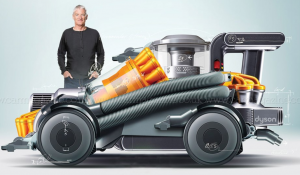 Sir James Dyson has revealed what many automotive industry insiders already knew by rumour – his company is developing an Electric car ! The fact that Dyson have no automotive precedence or manufacturing facility should not be seen as a show stopper – there is plenty of subcontract capacity available (at a price) although his timescale of 2 years to volume manufacture is probably over ambitious.
Sir James Dyson has revealed what many automotive industry insiders already knew by rumour – his company is developing an Electric car ! The fact that Dyson have no automotive precedence or manufacturing facility should not be seen as a show stopper – there is plenty of subcontract capacity available (at a price) although his timescale of 2 years to volume manufacture is probably over ambitious.
Many current Automotive specialists will laugh at the idea of Dyson moving into this arena with its complex & demanding legislative requirements but perhaps that is missing the point.
Dyson recently bought innovative Solid State battery development company Sakti3 for $90 million & half of Dysons $2.7 billion will be spent on battery development.
The batteries developed by Sakti3 are Solid State which offer much higher energy densities & battery life than current Lithium Ion batteries.
Perhaps the likely scenario is that Dyson will use his Electric car to showcase the real diamond in the rough – a vastly superior battery technology which will then be licensed to the main automotive players enabling the Wiltshire Innovator to truly ‘clean up’
chris@amberhill.biz
www.amberhillassociates.com

 Much has been said about the ‘evils’ of Globalisation & the impact on impoverished workers resulting in Brexit in the U.K & Trumps victory over the pond. But what about the positive impacts of Globalisation which are rarely trumpeted (excuse the pun)
Much has been said about the ‘evils’ of Globalisation & the impact on impoverished workers resulting in Brexit in the U.K & Trumps victory over the pond. But what about the positive impacts of Globalisation which are rarely trumpeted (excuse the pun)







 This incident highlights the ethical dilemmas posed in Subcontracting. How do we deal with massive corporations which often dwarf our own ? How do we balance the need to reduce manufacturing cost with the need to deal with undemocratic regimes with questionable human rights records ?
This incident highlights the ethical dilemmas posed in Subcontracting. How do we deal with massive corporations which often dwarf our own ? How do we balance the need to reduce manufacturing cost with the need to deal with undemocratic regimes with questionable human rights records ? The outsourcing market is a large, diversified and complex model but it is still possible to discern some notable trends:-
The outsourcing market is a large, diversified and complex model but it is still possible to discern some notable trends:-